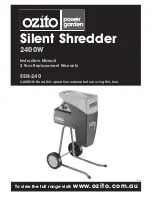
Gasoline Fires and Handling Fuel Safely
Use extra care in handling gasoline and other fuels. They are flammable and vapors are explosive.
1. When storing extra fuel be sure that it is in an appropriate container and away from any fire hazards.
2. Prevent fire and explosion caused by static electric discharge. Use only nonmetal, portable fuel containers
approved by the Underwriter’s Laboratory (U.L.) or the American Society for Testing &Materials.
3. Always fill fuel tank outside in a well ventilated area. Never fill your fuel tank with fuel indoors. (Examples
include: basement, garage, barn, shed, house, porch, etc.) Never fill tank near appliances with pilot lights,
heaters, or other ignition sources. If the fuel has to be drained, this should be done outdoors. The drained fuel
should be stored in a container specifically designed for fuel storage or it should be disposed of carefully.
4. Never remove the fuel cap or add fuel with the engine running. Stop engine and allow to cool before filling.
5. Do not smoke while refueling or operating engine.
6. Never drain fuel from the engine in an enclosed area.
7. Always wipe up excess (spilled) fuel from engine before starting. Clean up spilled fuel immediately. If fuel is
spilled, do not start the engine but move machine and fuel container from area. Clean up spilled fuel and allow to
evaporate and dry after wiping and before starting.
8. Allow fuel fumes/vapors to escape from the area before starting engine.
9. Test the fuel cap for proper installation before starting and using engine.
10. Always run the engine with fuel cap properly installed on the engine.
11. During storage, keep machine so gas cap is up.
12. Never siphon fuel by mouth to drain fuel tank.
13. Always have an adult fill the fuel tank and never allow children to fill the engine.
14. Never allow an adult or anyone under the influence of drugs or alcohol to fill engine.
15. When storing gasoline or equipment with fuel in the tank, store away from furnaces, stoves, water heaters or
other appliances that have a pilot light or other ignition source because they can ignite gasoline vapors.
16. Never fill containers inside a vehicle or on a truck bed with a plastic bed liner. Always place containers on the
ground away from your vehicle before filling.
17. Remove gas-powered equipment from the truck or trailer and refuel it on the ground. If this is not possible, then
refuel such equipment on a trailer with a portable container, rather than from a gasoline dispenser nozzle.
Burns and Fires
The muffler, muffler guard and other parts of the engine become extremely hot during the operation of the engine.
These parts remain extremely hot after the engine has stopped.
Prevention of Burns and Fires
1. Never remove the muffler guard from the engine.
2. Never touch the muffler guard because it is extremely hot and will cause severe burns.
3. Never touch parts of the engine that become hot after operation.
4. Always keep materials and debris away from muffler guard and other hot parts of the engine to avoid fires.
Children and Bystanders
Tragic accidents can occur if the operator is not alert to the presence of children and/or bystanders. Never assume
that others will remain where you last saw them.
1. Keep the area of operation clear of all persons, especially small children and pets. Keep children under the
watchful care of a responsible adult.
2. Be alert and turn the machine off if children enter the area.
3. Before and while moving backwards, look behind and down for small children.
4. Never allow children to operate the machine
4































